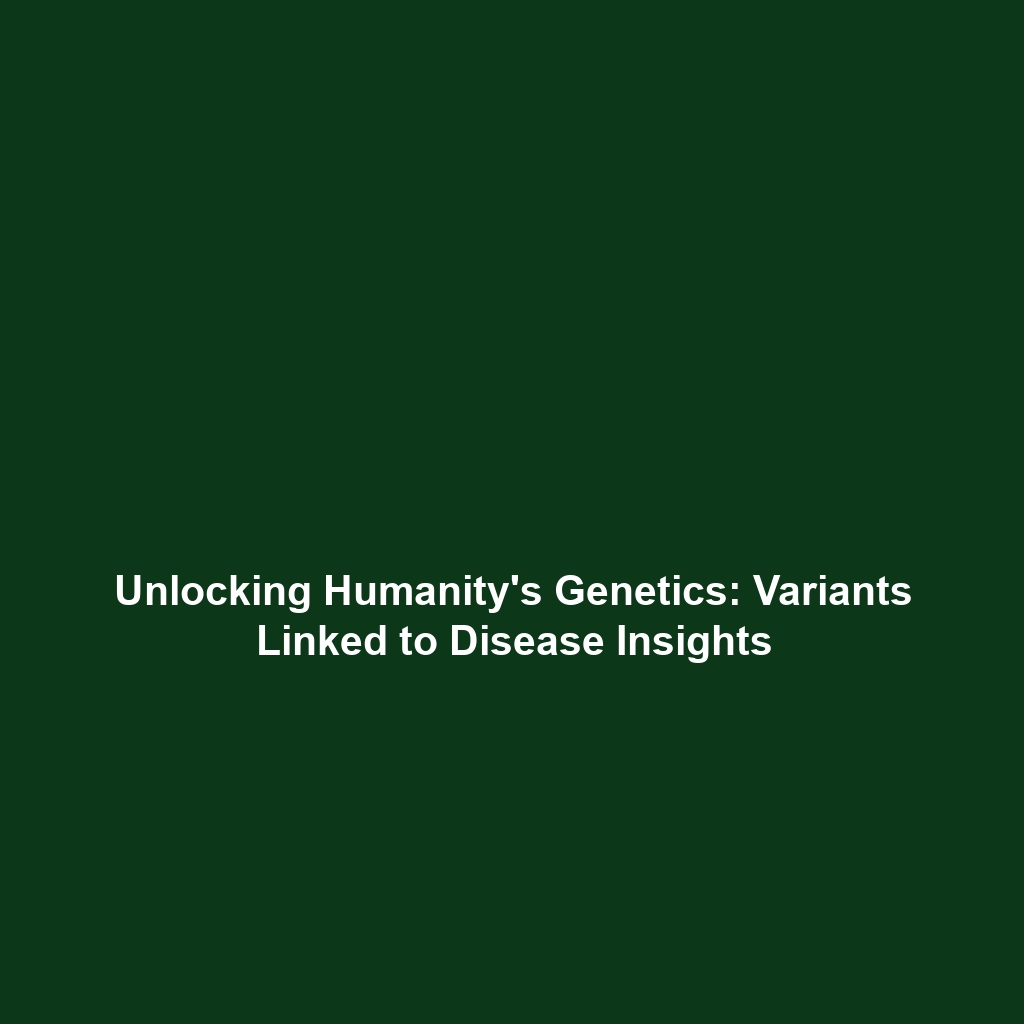Insights into Common Genetic Variants and Their Association with Disease
Introduction
The study of common genetic variants across humanity offers profound insights into our shared biological heritage and its correlation with various diseases. By understanding these genetic discrepancies, researchers can pinpoint how specific variants contribute to disease susceptibility. This exploration is pivotal, especially in the context of the Human Genome Project, which aimed to map the complete human genome and unravel the genetic blueprint essential for human health. The identification of these variants establishes foundational knowledge that can drive innovations in medicine and public health, making this a critical area of ongoing research.
Key Concepts
Understanding Genetic Variants
Genetic variants are differences in the DNA sequence among individuals. These variations can manifest as single nucleotide polymorphisms (SNPs), insertions, or deletions, each of which may influence an individual’s risk of developing certain diseases. The Human Genome Project laid the groundwork by providing a comprehensive understanding of the human genome, enabling researchers to link specific alleles to health outcomes.
Importance of Common Variants
Common genetic variants, defined as those present in more than 1% of the population, contribute significantly to the heritability of complex diseases such as diabetes, heart disease, and certain cancers. Recognizing these associations is crucial for developing targeted therapies and personalized medicine.
Applications and Real-World Uses
The insights gained from understanding genetic variants and their association with disease are utilized in various practical applications:
- Genetic Screening: Identifying individuals at risk of hereditary diseases.
- Personalized Medicine: Tailoring treatments based on genetic profiles.
- Drug Development: Using genetic information to create targeted therapies.
- Public Health Initiatives: Informing strategies to combat genetic diseases in populations.
These applications illustrate the significance of how insights into common genetic variants improve healthcare approaches, aligning closely with the objectives of the Human Genome Project.
Current Challenges
Despite the progress, several challenges remain in studying and applying insights from genetic variants:
- Data Interpretation: The vast amount of genetic data can complicate the understanding of complex interactions.
- Ethical Considerations: Issues surrounding genetic privacy and discrimination may arise.
- Population Diversity: A significant portion of genetic research is focused on populations of European descent, leading to less comprehensive data for other groups.
- Integration into Clinical Practice: Bridging the gap between genetic research and practical medical applications remains a challenge.
Future Research and Innovations
The future of research into genetic variants looks promising with several emerging technologies:
- Next-Generation Sequencing: Enhances resolution in identifying genetic variations.
- CRISPR and Gene Editing: Potential for correcting deleterious mutations linked to disease.
- Artificial Intelligence: Utilizing AI to predict disease susceptibility based on genomic data.
- Global Genomic Collaboration: Initiatives aimed at creating a more inclusive genomic database that represents diverse populations.
These advancements may significantly impact our understanding of genetic variants and their associations with diseases, driving the legacy of the Human Genome Project forward.
Conclusion
In summary, the exploration of common genetic variants and their association with disease serves as a crucial pillar in the journey of genetics and personalized medicine, stemming from the discoveries made by the Human Genome Project. As research continues to evolve, it is imperative to address the current challenges head-on while fostering innovations that promise to transform healthcare. For further reading on related topics and advancements, consider exploring our articles on genetic screening and personalized medicine.

Leave a Reply